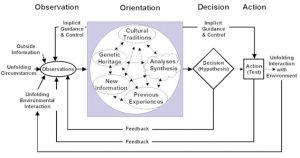
While discussing the proposed OMG Decision Modelling standard with business rules specialist Ron Ross recently, Ron reminded me of the list of “roles” that “decisions” can provide:
Classification, Evaluation, Selection, Approval, Assessment, Assignment, Allocation, Diagnosis, Prediction
Curious as to what sources might refer to this list, I “googled” for these terms and one of the first relevant results was…
Threat evaluation and weapon assignment decision support: A review of the state of the art (2006-2007)
This is a fascinating paper that targets the military domain but nonetheless is very relevant to CEP (and indeed business) methodology:
- “Threat evaluation” is also a business task: business threats are things like poor customer satisfaction, poorly managed product marketing, changing business conditions (locally or across the business), inability to predict business changes, regulatory compliance risks, and so on.
- “Command and control” (a.k.a. business management) methodologies are also of interest: the paper refers to Boyd’s Orient-Observe-Decide-Act (OODA) cycle, Lawson’s Sense-Process-Compare-Decide-Act cycle, and a Monitor-Assess-Plan-Execute cycle.
- Orient means setting up measurements, or event sources
- Observe, Sense-Process-Compare, and Monitor means event (including “complex event”) detection, and all the associated processes for complex event processing.
- Decide means making some decision based on our observed events.
- Act and Plan-Execute mean behaviors that in turn will likely affect the environment and future events.
- The paper refers to the JDL Data Fusion model which may well be familiar to some CEP folk: this model describes (with a minor translation from the table in the paper) the use of and relationships between:
- event assessment
- complex event or entity assessment
- situation or state assessment
- impact or cost-benefit assessment
- performance or goal assessment.
I would therefore claim that the relationship between events and decisions seems not only very clear, but also well recognised.





